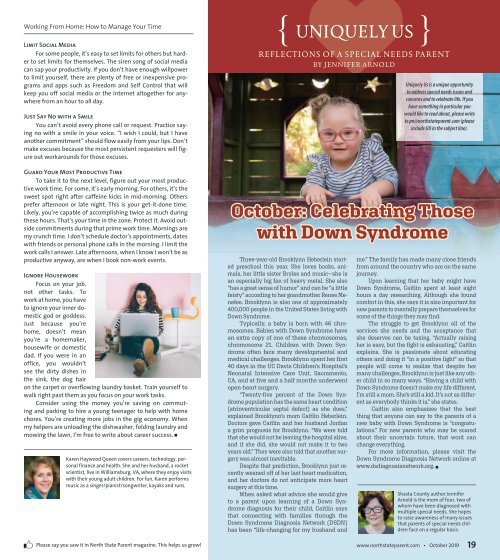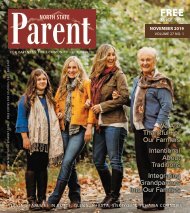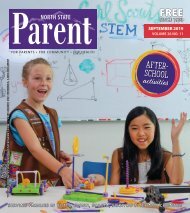North State Parent October 2019
Create successful ePaper yourself
Turn your PDF publications into a flip-book with our unique Google optimized e-Paper software.
Working From Home: How to Manage Your Time<br />
Limit Social Media<br />
For some people, it’s easy to set limits for others but harder<br />
to set limits for themselves. The siren song of social media<br />
can sap your productivity. If you don’t have enough willpower<br />
to limit yourself, there are plenty of free or inexpensive programs<br />
and apps such as Freedom and Self Control that will<br />
keep you off social media or the internet altogether for anywhere<br />
from an hour to all day.<br />
Just Say No with a Smile<br />
You can’t avoid every phone call or request. Practice saying<br />
no with a smile in your voice. “I wish I could, but I have<br />
another commitment” should flow easily from your lips. Don’t<br />
make excuses because the most persistent requesters will figure<br />
out workarounds for those excuses.<br />
Guard Your Most Productive Time<br />
To take it to the next level, figure out your most productive<br />
work time. For some, it’s early morning. For others, it’s the<br />
sweet spot right after caffeine kicks in mid-morning. Others<br />
prefer afternoon or late night. This is your get-it-done time.<br />
Likely, you’re capable of accomplishing twice as much during<br />
these hours. That’s your time in the zone. Protect it. Avoid outside<br />
commitments during that prime work time. Mornings are<br />
my crunch time. I don’t schedule doctor’s appointments, dates<br />
with friends or personal phone calls in the morning. I limit the<br />
work calls I answer. Late afternoons, when I know I won’t be as<br />
productive anyway, are when I book non-work events.<br />
Ignore Housework<br />
Focus on your job,<br />
not other tasks. To<br />
work at home, you have<br />
to ignore your inner domestic<br />
god or goddess.<br />
Just because you’re<br />
home, doesn’t mean<br />
you’re a homemaker,<br />
housewife or domestic<br />
dad. If you were in an<br />
office, you wouldn’t<br />
see the dirty dishes in<br />
the sink, the dog hair<br />
on the carpet or overflowing laundry basket. Train yourself to<br />
walk right past them as you focus on your work tasks.<br />
Consider using the money you’re saving on commuting<br />
and parking to hire a young teenager to help with home<br />
chores. You’re creating more jobs in the gig economy. When<br />
my helpers are unloading the dishwasher, folding laundry and<br />
mowing the lawn, I’m free to write about career success. Ó<br />
Karen Haywood Queen covers careers, technology, personal<br />
finance and health. She and her husband, a rocket<br />
scientist, live in Williamsburg, VA, where they enjoy visits<br />
with their young adult children. For fun, Karen performs<br />
music as a singer/pianist/songwriter, kayaks and runs.<br />
Please say you saw it in <strong>North</strong> <strong>State</strong> <strong>Parent</strong> magazine. This helps us grow!<br />
{<br />
REFLECTIONS OF A SPECIAL NEEDS PARENT<br />
BY JENNIFER ARNOLD<br />
Three-year-old Brooklynn Heberlein started<br />
preschool this year. She loves books, animals,<br />
her little sister Brylee and music—she is<br />
an especially big fan of heavy metal. She also<br />
“has a great sense of humor” and can be “a little<br />
feisty” according to her grandmother Renee Menefee.<br />
Brooklynn is also one of approximately<br />
400,000 people in the United <strong>State</strong>s living with<br />
Down Syndrome.<br />
Typically, a baby is born with 46 chromosomes.<br />
Babies with Down Syndrome have<br />
an extra copy of one of these chromosomes,<br />
chromosome 21. Children with Down Syndrome<br />
often face many developmental and<br />
medical challenges. Brooklynn spent her first<br />
40 days in the UC Davis Children’s Hospital’s<br />
Neonatal Intensive Care Unit, Sacramento,<br />
CA, and at five and a half months underwent<br />
open-heart surgery.<br />
“Twenty-five percent of the Down Syndrome<br />
population has the same heart condition<br />
(atrioventricular septal defect) as she does,”<br />
explained Brooklynn’s mom Caitlin Heberlein.<br />
Doctors gave Caitlin and her husband Jordan<br />
a grim prognosis for Brooklynn. “We were told<br />
that she would not be leaving the hospital alive,<br />
and if she did, she would not make it to two<br />
years old.” They were also told that another surgery<br />
was almost inevitable.<br />
Despite that prediction, Brooklynn just recently<br />
weaned off of her last heart medication,<br />
and her doctors do not anticipate more heart<br />
surgery at this time.<br />
When asked what advice she would give<br />
to a parent upon learning of a Down Syndrome<br />
diagnosis for their child, Caitlin says<br />
that connecting with families through the<br />
Down Syndrome Diagnosis Network (DSDN)<br />
has been “life-changing for my husband and<br />
UNIQUELY US<br />
<strong>October</strong>: Celebrating Those<br />
with Down Syndrome<br />
me.” The family has made many close friends<br />
from around the country who are on the same<br />
journey.<br />
Upon learning that her baby might have<br />
Down Syndrome, Caitlin spent at least eight<br />
hours a day researching. Although she found<br />
comfort in this, she says it is also important for<br />
new parents to mentally prepare themselves for<br />
some of the things they may find.<br />
The struggle to get Brooklynn all of the<br />
services she needs and the acceptance that<br />
she deserves can be taxing. “Actually raising<br />
her is easy, but the fight is exhausting,” Caitlin<br />
explains. She is passionate about educating<br />
others and doing it “in a positive light” so that<br />
people will come to realize that despite her<br />
many challenges, Brooklynn is just like any other<br />
child in so many ways. “Having a child with<br />
Down Syndrome doesn’t make my life different.<br />
I’m still a mom. She’s still a kid. It’s not as different<br />
as everybody thinks it is,” she states.<br />
Caitlin also emphasizes that the best<br />
thing that anyone can say to the parents of a<br />
new baby with Down Syndrome is “congratulations.”<br />
For new parents who may be scared<br />
about their uncertain future, that word can<br />
change everything.<br />
For more information, please visit the<br />
Down Syndrome Diagnosis Network online at<br />
www.dsdiagnosisnetwork.org. Ó<br />
Shasta County author Jennifer<br />
Arnold is the mom of four, two of<br />
whom have been diagnosed with<br />
multiple special needs. She hopes<br />
to raise awareness of many issues<br />
that parents of special needs children<br />
face on a regular basis.<br />
www.northstateparent.com • <strong>October</strong> <strong>2019</strong> 19<br />
{<br />
Uniquely Us is a unique opportunity<br />
to address special needs issues and<br />
concerns and to celebrate life. If you<br />
have something in particular you<br />
would like to read about, please write<br />
to pn@northstateparent.com (please<br />
include UU in the subject line).




